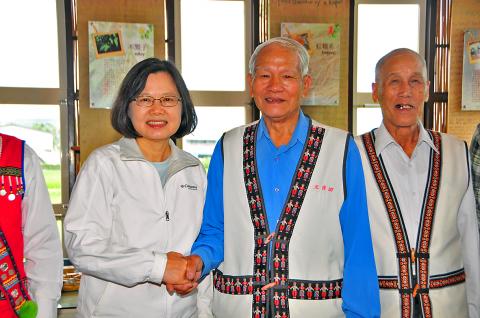Amid calls from politicians and the public for stricter regulations governing acceptable behavior on social media Web sites, Democratic Progressive Party Chairperson Tsai Ing-wen (蔡英文) yesterday expressed concern that such measures would harm Taiwan’s hard-earned right to freedom of speech.
Following the suicide of entertainer Cindy Yang (楊又穎), which her family attributes to vituperative online criticism, a number of politicians, media outlets and academics have called for laws to be amended to allow for stricter penalties for “online bullying,” — aimed at preventing a similar tragedy from occurring.
However, Tsai, the DPP’s presidential candidate, said she was opposed to such moves.

Photo: Hua Meng-ching, Taipei Times
“Malicious criticism, twisting facts and spreading rumors on the Internet are definitely very bad things, but if the problem was addressed by legislation, we worry what harm such legislation might do to freedom of speech,” Tsai said in response to media queries while on a visit to Hualien County. “In a democracy, people cherish freedom of speech, especially for a society like Taiwan, which has been through the Martial Law era, and we expect to have freedom of speech.”
She said that as well as encouraging self-restraint, Web site administers should take responsibility for preventing such language on the Internet.
“In a democracy, everyone is responsible for solving such issues, and it is not something that can be dealt with through legislation,” she said.
There is existing legislation that can be applied to online bullying, and she would encourage all victims to take legal action against those who make malicious statements online, she said.
Tsai has been on a tour of Hualien since Friday, visiting opinion leaders, businesspeople and young people, aiming to listen to their views on Taiwan’s future.
Tsai said she would assist local communities to develop their own specialty industries, so that young people from Hualien County and Taitung County could return home to work after gaining university degrees elsewhere.

The CIA has a message for Chinese government officials worried about their place in Chinese President Xi Jinping’s (習近平) government: Come work with us. The agency released two Mandarin-language videos on social media on Thursday inviting disgruntled officials to contact the CIA. The recruitment videos posted on YouTube and X racked up more than 5 million views combined in their first day. The outreach comes as CIA Director John Ratcliffe has vowed to boost the agency’s use of intelligence from human sources and its focus on China, which has recently targeted US officials with its own espionage operations. The videos are “aimed at

STEADFAST FRIEND: The bills encourage increased Taiwan-US engagement and address China’s distortion of UN Resolution 2758 to isolate Taiwan internationally The Presidential Office yesterday thanked the US House of Representatives for unanimously passing two Taiwan-related bills highlighting its solid support for Taiwan’s democracy and global participation, and for deepening bilateral relations. One of the bills, the Taiwan Assurance Implementation Act, requires the US Department of State to periodically review its guidelines for engagement with Taiwan, and report to the US Congress on the guidelines and plans to lift self-imposed limitations on US-Taiwan engagement. The other bill is the Taiwan International Solidarity Act, which clarifies that UN Resolution 2758 does not address the issue of the representation of Taiwan or its people in

US Indo-Pacific Commander Admiral Samuel Paparo on Friday expressed concern over the rate at which China is diversifying its military exercises, the Financial Times (FT) reported on Saturday. “The rates of change on the depth and breadth of their exercises is the one non-linear effect that I’ve seen in the last year that wakes me up at night or keeps me up at night,” Paparo was quoted by FT as saying while attending the annual Sedona Forum at the McCain Institute in Arizona. Paparo also expressed concern over the speed with which China was expanding its military. While the US

SHIFT: Taiwan’s better-than-expected first-quarter GDP and signs of weakness in the US have driven global capital back to emerging markets, the central bank head said The central bank yesterday blamed market speculation for the steep rise in the local currency, and urged exporters and financial institutions to stay calm and stop panic sell-offs to avoid hurting their own profitability. The nation’s top monetary policymaker said that it would step in, if necessary, to maintain order and stability in the foreign exchange market. The remarks came as the NT dollar yesterday closed up NT$0.919 to NT$30.145 against the US dollar in Taipei trading, after rising as high as NT$29.59 in intraday trading. The local currency has surged 5.85 percent against the greenback over the past two sessions, central